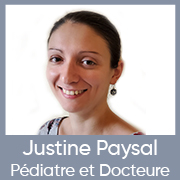[Portrait] Justine Paysal, paediatrician and doctor in STAPS
What is your job and your speciality?
The job of a paediatrician, a doctor specialising in children, consists of monitoring the physiological and psychological development of children and adolescents and diagnosing and treating any pathologies.
I work in a hospital environment. It offers several advantages such as easy access to complementary examinations (X-rays, biology, etc.), the pleasure of working in a team and also the possibility of including a research activity in my schedule.

- Taking care of newborns, and organising appropriate follow-up
- Management of possible emergency situations (e.g. poor adaptation in the delivery room)
- Management of sometimes complex diagnoses and treatments (advice from reference centres, study of articles published on the subject, multidisciplinary meetings required),
- Announcement of diagnosis, education/advice to parents,
- Assessment of precarious social situations and implementation of possible support,
- Research activity with implementation and management of clinical studies.
What motivated your choice of profession?
Medical studies represent a very beautiful, extremely rich and interesting training which approaches very different specialities (from cardiology to psychiatry, passing by pharmacology or public health...). These studies alternate theoretical courses with practical teaching (internships in hospital services), which justifies their duration.
Although the profession certainly requires a significant investment, it offers a privileged link with the child and his family. This profession brings a great deal of personal satisfaction to the work and allows you to build a special relationship with a whole paramedical and medical team, allowing you to learn, to question and to challenge yourself. Loving to care, loving to see a child and his family flourish is what motivates me.
As far as my research activity is concerned, I would say that what motivates me is the desire to better understand certain pathologies and also the desire to improve our treatment.
How has your doctorate been a springboard to your profession?
The doctorate has brought me a lot by allowing me to integrate a research activity into my schedule and to have access to the status of a university hospitalist. The science thesis work gave me very useful keys in my activity as a doctor: like developing my scientific curiosity and better understanding the methodologies applied in certain works to have a more critical analysis of the results. This thesis also allowed me to have a more global vision of the problems that one can encounter as a doctor, to facilitate the questioning of knowledge that one believes to have been acquired.
I also learned to better manage and organise my working time, to develop my ability to synthesise, and my skills in making written or oral presentations... Qualities that are also sought after in the work of a doctor.
In addition, during this PhD I had the opportunity to train in the performance and interpretation of cardiac ultrasound which helps me enormously during some of my shifts in intensive care.
What advice would you give to students who want to go into this speciality?
- Be patient because the study and learning process is long.
- Be determined because you have to be able to make concessions for your work, to get over difficult periods (serious situations, failures, etc.)
- Knowing how to adapt, because in medicine, as in research, some variables are not controllable and events do not always go as planned.
- Being organised because very quickly the schedule is very full and you have to prioritise.
The Cardiovascular Pharm-Ecology Laboratory (LaPEC)
Mis à jour le 22 December 2022